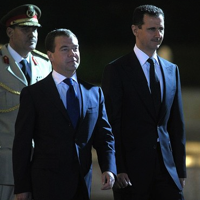Russia is trying to look tough at the U.N. Security Council this week, promising to reject a resolution backed by the European Union, the U.S. and the Arab League that calls for a political transition in Syria to end the violence there.* This is a new phase in Moscow’s efforts to defend its friend, Syrian President Bashar al-Assad, which included blocking an earlier resolution in October that threatened U.N. sanctions against Damascus. Yet while Russia can use its veto power to paralyze the council again, the diplomatic battle over Syria has highlighted its weakness in global affairs.
The U.N. serves as the last bastion of Russian power in the international system. After the Cold War, the U.S. and its European partners dismissed calls from some Western hawks to prevent Russia from taking up the Soviet seat on the Security Council. The logic was clear: Moscow still had a lot of nuclear weapons at its disposal, and a place at the U.N.’s top table offered it a degree of residual prestige as well as reassurance regarding Western intentions.
By contrast, although Russia has also taken up seats in the G-8 and G-20, and will host the latter in 2013, it rarely plays a significant role in multilateral financial diplomacy, preferring instead to stick close to China. More generally, Russia has tried to boost its global leverage by caucusing with Brazil, India, China and South Africa under the BRICS banner. In reality, this grouping is a façade: while the Brazil and the Asian powers have economic momentum, Russia has fared woefully during the financial downturn. A brutally insightful report (.pdf) from the European Council on Foreign Relations argues that the country is in a “post-BRIC” phase characterized by “widespread corruption, a dysfunctional government and growing dissatisfaction with the ruling elite.”

